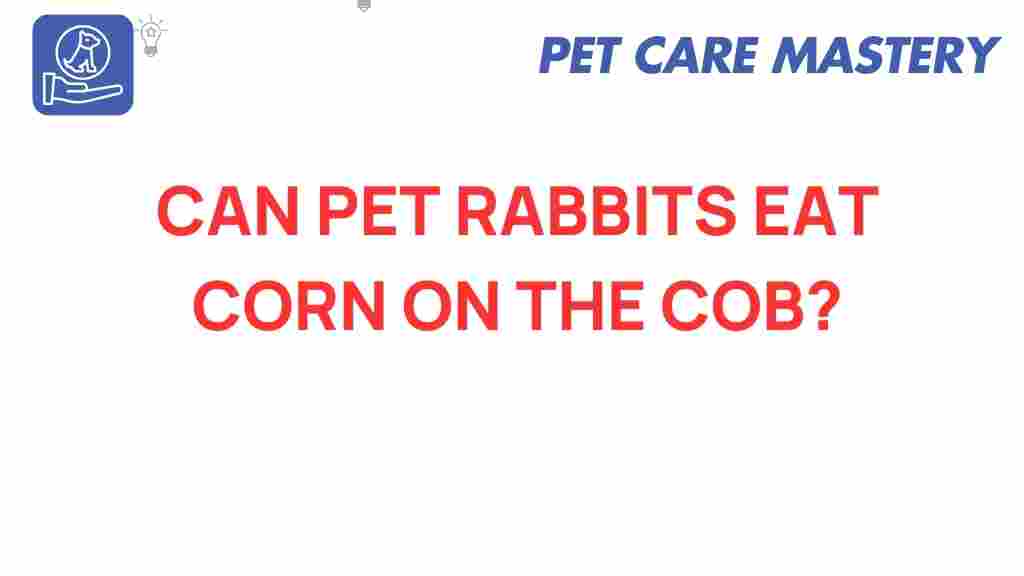The Surprising Truth: Can Pet Rabbits Eat Corn on the Cob?
As a pet owner, ensuring the health and happiness of your furry friend is a top priority. When it comes to feeding pet rabbits, you may have encountered numerous questions and misconceptions about their dietary needs. One topic that often raises eyebrows is the suitability of corn on the cob in a rabbit’s diet. This article will explore whether pet rabbits can eat corn on the cob, the nutritional benefits and risks, and what you should consider when offering new foods to your rabbit.
Understanding the Nutritional Needs of Pet Rabbits
Before diving into the specifics of corn on the cob, it’s crucial to understand the dietary requirements of pet rabbits. Rabbits are herbivores, and their diet should primarily consist of:
- Hay: Unlimited access to high-quality hay is essential for a rabbit’s digestive health.
- Fresh Vegetables: Leafy greens and a variety of vegetables should make up a significant portion of their diet.
- Pellets: A small amount of specially formulated rabbit pellets can provide essential nutrients.
- Fresh Water: Clean, fresh water must always be available.
Understanding the right balance of these components is key to keeping your pet rabbit healthy and thriving.
Can Pet Rabbits Eat Corn on the Cob?
The short answer is: it’s not advisable. Here’s why:
- High Sugar Content: Corn is high in carbohydrates and sugars, which can lead to obesity and digestive issues in pet rabbits.
- Low Fiber: A diet low in fiber can cause serious health problems, including gastrointestinal stasis, a condition that can be life-threatening.
- Potential Toxicity: While corn is not toxic, the hull and cob can pose a choking hazard or cause blockages in the digestive tract.
In summary, while a small nibble of corn may not immediately harm your pet rabbit, it is not an ideal food choice and should generally be avoided.
The Risks of Feeding Corn on the Cob to Pet Rabbits
Feeding corn on the cob to your pet rabbit can lead to several health issues, including:
- Obesity: The high sugar content can lead to weight gain if fed in excess.
- Digestive Problems: Rabbits require a high-fiber diet to facilitate healthy digestion. Corn lacks sufficient fiber.
- Dental Issues: Chewing hard corn cobs may cause dental problems or injury to your rabbit’s teeth.
What Should You Feed Your Pet Rabbit Instead?
To ensure your pet rabbit receives a balanced diet, consider these healthier alternatives:
- Leafy Greens: Offer a variety of dark leafy greens such as kale, romaine lettuce, and cilantro.
- Vegetables: Carrots, bell peppers, and broccoli can be given in moderation.
- Herbs: Fresh herbs like parsley, basil, and mint are great for variety.
- Fruit: Small amounts of fruit, such as apples (without seeds), strawberries, or bananas can be a treat.
Always introduce new foods slowly and in moderation to monitor your rabbit’s reaction.
Step-by-Step Guide to Introducing New Foods to Your Pet Rabbit
Introducing new foods to your pet rabbit should be done carefully. Follow this step-by-step guide:
- Research: Always do your homework on any new food before offering it to your rabbit.
- Start Small: Offer a very small piece of the new food, about the size of a dime.
- Observe: Watch your rabbit closely for any signs of digestive upset, such as diarrhea or changes in behavior.
- Gradually Increase: If your rabbit shows no adverse reactions after 24 hours, you can gradually increase the amount.
- Consult Your Vet: If you have any doubts about your rabbit’s diet, consult with a veterinarian who specializes in exotic pets.
Troubleshooting Common Feeding Issues
Even with the best intentions, you may run into some feeding challenges. Here are common issues and tips on how to address them:
- Refusal to Eat: If your rabbit refuses a new food, don’t force it. Try offering it again later or look for alternatives.
- Diarrhea: If your rabbit develops diarrhea after introducing a new food, remove it immediately and offer plenty of hay and water.
- Obesity: Monitor your rabbit’s weight regularly. If your rabbit is gaining weight, adjust its diet accordingly by reducing high-calorie treats.
Conclusion
While the question, “Can pet rabbits eat corn on the cob?” may seem straightforward, the answer reveals a need for caution. Corn on the cob is not a suitable food for rabbits due to its high sugar content, low fiber, and potential health risks. Instead, focus on providing a balanced diet rich in hay, fresh vegetables, and limited pellets and treats. By doing so, you will help ensure your pet rabbit lives a long, healthy, and happy life.
For more information on rabbit care and feeding tips, check out our rabbit care guide. If you’re looking for a detailed resource on rabbit nutrition, visit this external link.
This article is in the category Nutrition and created by PetCareMastery Team
